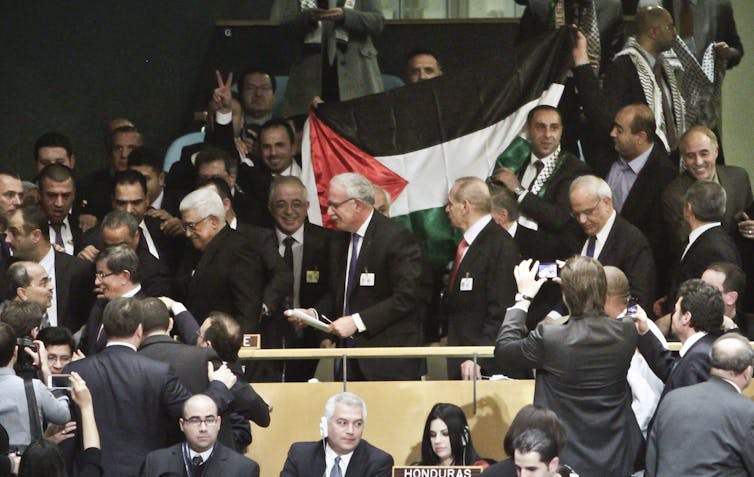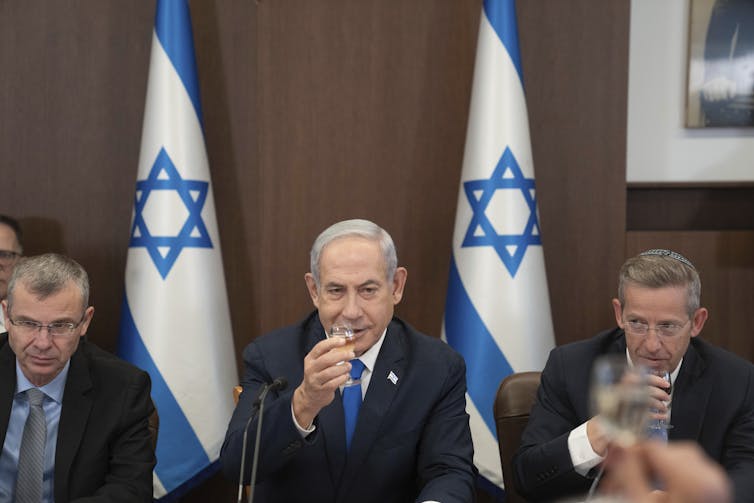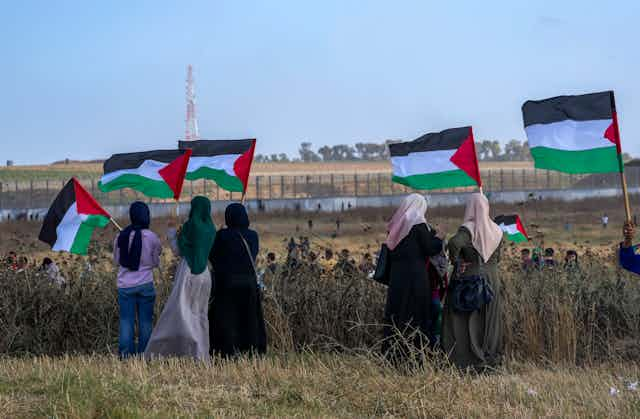This week marked the 30th anniversary of the Oslo Accords aimed at bringing about Palestinian self-determination. The occasion has served as a stark reminder of the unfulfilled promises and unresolved struggles of the Palestinian quest for statehood.
The simplistic question of whether Palestine has statehood or not obscures its broader struggle for recognition, dignity and human rights.
Academic, political and public debates, often snared in legal technicalities, fall short of capturing the lived realities of Palestinians under Israeli occupation and their relentless quest for sovereignty.
Rethinking sovereignty
Sovereignty is a complex concept with multiple dimensions. In his 1999 book Sovereignty: Organized Hypocrisy, American international relations scholar Stephen Krasner identified four key aspects:
- Domestic sovereignty, which refers to the internal authority and governance within a territory;
- Interdependence sovereignty, focusing on control over the movement of goods, people and information across borders;
- International legal sovereignty, pertaining to recognition by other states and international bodies;
- Westphalian sovereignty, emphasizing non-interference in domestic affairs by external powers.
Almost 25 years since the book’s publication, these aspects still provide a nuanced framework to understand the various facets of statehood and enable a more comprehensive exploration of the Palestinian quest for sovereignty.
The history of Palestinian statehood is marked by shifts in Krasner’s sovereignty categories. Understanding them can shed light on the complex dynamics and key challenges in the Palestinian statehood pursuit.

Domestic sovereignty
Palestine’s struggle for domestic sovereignty, or control within the Palestinian territory, can be traced back to what’s known as the British Mandate period, leading to the establishment of the State of Israel in 1948.
Following the Six-Day War in 1967, Israel’s West Bank and Gaza Strip occupation further complicated domestic control.
The Oslo Accords of 1993 and 1995 provided a framework for Palestinian self-governance in certain areas, but left full sovereignty unresolved. Internal divisions within the Palestinian policy have further undermined domestic sovereignty.
Interdependence sovereignty
Israeli restrictions on movement and trade have historically limited Palestinian efforts to control transborder flows.
The Paris Protocol of 1994 aimed to regulate economic relations between Israel and the Palestinian territories, but led to a lopsided dependency on Israeli goods and labour markets.
The blockade of Gaza since 2007 has further constrained interdependence sovereignty.
International legal sovereignty
The journey towards international legal sovereignty for Palestine has involved significant milestones, such as the Arab League’s recognition of the Palestine Liberation Organization as the sole legitimate representative of the Palestinian people in 1974.
The Palestinian Declaration of Independence in 1988 garnered recognition from more than 70 countries. The United Nations General Assembly’s acceptance of Palestine as a non-member observer state in 2012 marked further progress, yet full UN membership remains elusive.
Westphalian sovereignty
The principle of non-intervention in Palestinian affairs has been consistently challenged by Israeli occupation, settlement expansion and international mediation efforts.
The peace process often involves external influence through negotiations or initiatives led by what’s known as the Quartet, the group comprising the United States, Russia, the European Union and the United Nations that is supposed to work on Israeli-Palestinian peace issues.
Following Russia’s invasion of Ukraine and long inaction by the Quartet, the group has been criticized for lacking legitimacy.
Recent developments
Under the leadership of former prime minister Salam Fayyad and following a schism between the two major factions in Palestinian politics — Fatah and Hamas — the Palestinian Authority’s international strategy has been aimed at leveraging various dimensions of sovereignty. That’s in an attempt to amplify its global presence and cement its domestic dominance.
Engaging with international organizations to increase interdependence sovereignty, Palestine applied for UN membership in 2011 and was accepted as a UNESCO member in October of the same year, aligning with international norms.
This pursuit of Westphalian sovereignty — the principle of non-intervention in Palestinian affairs — has been evident in Palestine’s success in garnering recognition from 139 UN member states asserting the right to domestic authority.
Efforts to consolidate domestic sovereignty were reflected in the Cairo Agreement between Fatah and Hamas in May 2012, and although reconciliation attempts failed between 2011 and 2018, they nonetheless emphasized domestic cohesion.
The granting of non-member observer state status to Palestine by the UN General Assembly in 2012 was significant for international legal sovereignty, providing recognition in international law.

Violence, setbacks
The struggles and setbacks of the Palestinian quest for statehood have been worsened by recent shifts in U.S. policy, each undermining different dimensions of Palestinian sovereignty.
These setbacks have been intensified by the grim fact that 2022 was the deadliest year for Palestinians in the Israeli-occupied West Bank in 16 years.
Israeli forces killed more Palestinians in the West Bank in 2022 than in any year since the UN began recording fatalities in 2005, after the last major Palestinian uprising.
Under the Barack Obama administration from 2009 to 2017, the U.S. failed to negotiate a two-state solution and increased military aid to Israel. American engagement had little impact on Palestinian sovereignty.
The Donald Trump administration’s pro-Israel stance from 2017 to 2021, including the recognition of Jerusalem as Israel’s capital in 2017 and the Abraham Accords in 2020, eroded previous U.S. commitments to a two-state solution, undermining Palestinian claims to international legal sovereignty.
While reaffirming support for a two-state solution, Joe Biden’s administration has not deviated significantly from Trump’s approach, leaving Palestine’s aspirations for domestic and international legal sovereignty unmet.
Meanwhile, the current Israeli government, led by Prime Minister Benjamin Netanyahu, has exhibited extreme hostility towards Palestinian statehood.

International politics
These policy failures reflect the intricate and often contradictory nature of international engagement with Palestine, leaving the prospects for statehood entangled in global politics.
The Palestinian quest for statehood is now little more than a mirage within a disheartening landscape of renewed Israeli resolve, escalating desperation, violence and increasing international apathy.
Pursuing Palestinian statehood in any form appears increasingly elusive at the moment. But at the very least, Palestinians deserve full civil and political rights that are equal and equivalent to those enjoyed by Israelis.
The siren song of statehood — especially in the sense of what it has come to mean since the Oslo agreements — should no longer distract us from that goal.

